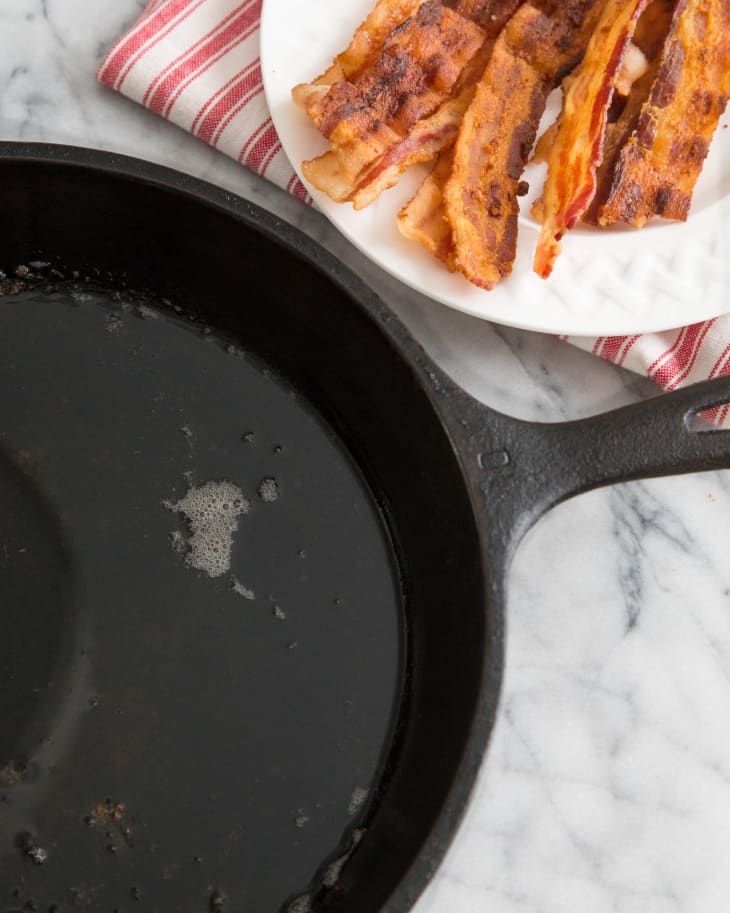What to Do With Beef Fat Runoff
Why You Should Save Meat Juices and Drippings

Today I want to talk about cooking with animal fats — the juicy drippings that pool beneath your roasted chicken; the savory oils left in the skillet after you brown some ground pork; and of course, all that good grease from freshly sizzled bacon — all of which usually get washed out or tossed away. Until today, that is.
These "leftover" juices and oils contain major savory flavoring power and can be used just like butter and vegetable oil to sauté a side of leafy greens or add that extra-crisp texture to roasted spuds. So instead of dumping them down the drain or toilet (which you should never do), let's start saving those juices and drippings, and start making full use of your ingredients and those dirtied pots and pans.
How to Use Animal Juices and Drippings
If you've ever enjoyed turkey gravy, you know the benefits of repurposing animal drippings — but let's start thinking beyond Thanksgiving. Any time you roast poultry, brown meat, or pan-fry bacon, have a secondary dish (or two) in mind that would benefit from the resulting juices and oils.
For example, say you decide to cook pork chops in a skillet for dinner. After a quick sear on the stove and a thorough cook in the oven, remove the pork chops from the pan and let the meat rest on a plate, covered in foil. Before you clean out that pan, put it right back on the stove, with the juices (using a potholder to safely handle the hot handle!), and add your vegetables — like sliced tomatoes, green beans, or roughly chopped kale or chard — and cook and sauté just as you would if using vegetable oil or butter.
Note: If you have more than 2 tablespoons of fats or juices in the skillet, pour off and save the excess (see below for instructions). Use your best judgment as to what's best for your health and diet.
For those times you have a pot of cooked polenta, beans, or lentils on the stove, pour a little bit into the pot and use the drippings in place of oil, butter, or seasoning. If you've made a leafy salad for your side, go ahead and use the juices just like a warm dressing — and don't be afraid to mix in a tiny bit of apricot jam or fresh berries to balance out the flavors. You can also use it to make freshly popped, savory popcorn.
Now, if using a roasting rack for a big leg of lamb or whole chicken, capture those flavorful juices by filling the pan (beneath the rack) with root vegetables, aromatics, and seasonal fruits. Be sure to use a wooden or metal spoon to stir everything once or twice during the roast, ensuring everything is cooking evenly. And when the meat is done, so is your sweet and savory side dish.
How to Save Animal Fat
Since we've discussed how to immediately use those animal fats and juices, let's spend a moment on how to properly store them for another evening and another dish. If saving fats and juices from a pan, pour into a glass container or jar, or even a mug (just nothing plastic) — this allows you transfer the fats and juices while still hot. Plus, it's much easier to clean once empty.
Place in the refrigerator to cool and harden; it keeps for up to a week. Use a spoon or knife to take out a little at a time and use like a pat of butter in the following ways:
- Grease a baking pan for your next savory dish.
- Roast asparagus, carrots, or squash.
- Scramble eggs.
- Make homemade croutons.
- Caramelize onions.
barringtononewalre.blogspot.com
Source: https://www.thekitchn.com/why-you-should-save-meat-juices-and-drippings-225070